英语经典赞美三十句
- 格式:doc
- 大小:35.50 KB
- 文档页数:6
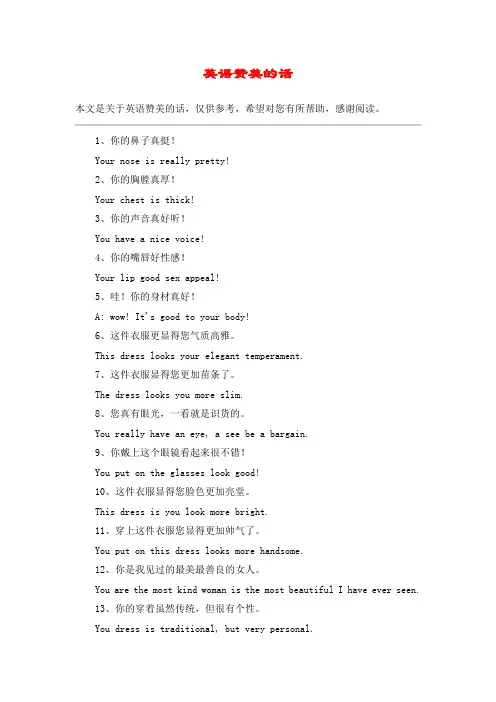
英语赞美的话本文是关于英语赞美的话,仅供参考,希望对您有所帮助,感谢阅读。
1、你的鼻子真挺!Your nose is really pretty!2、你的胸膛真厚!Your chest is thick!3、你的声音真好听!You have a nice voice!4、你的嘴唇好性感!Your lip good sex appeal!5、哇!你的身材真好!A: wow! It's good to your body!6、这件衣服更显得您气质高雅。
This dress looks your elegant temperament.7、这件衣服显得您更加苗条了。
The dress looks you more slim.8、您真有眼光,一看就是识货的。
You really have an eye, a see be a bargain.9、你戴上这个眼镜看起来很不错!You put on the glasses look good!10、这件衣服显得您脸色更加亮堂。
This dress is you look more bright.11、穿上这件衣服您显得更加帅气了。
You put on this dress looks more handsome.12、你是我见过的最美最善良的女人。
You are the most kind woman is the most beautiful I have ever seen.13、你的穿着虽然传统,但很有个性。
You dress is traditional, but very personal.14、大姐,您的发型好漂亮,哪里做的?Elder sister, your hair is gorgeous, where to do?15、你柔情似水,你的微笑让我如醉如痴。
Your gentle, your smile make me.16、您这一改,整个报告的质量就上去了。
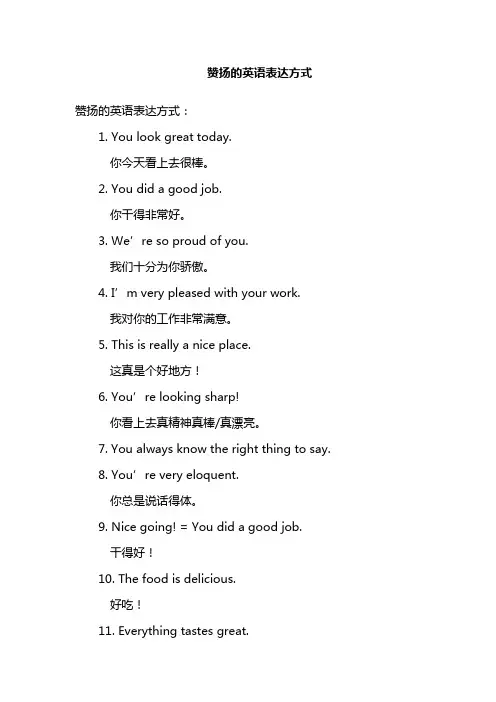
赞扬的英语表达方式赞扬的英语表达方式:1. You look great today.你今天看上去很棒。
2. You did a good job.你干得非常好。
3. We’re so proud of you.我们十分为你骄傲。
4. I’m very pleased with your work.我对你的工作非常满意。
5. This is really a nice place.这真是个好地方!6. You’re looking sharp!你看上去真精神真棒/真漂亮。
7.You always know the right thing to say.8. You’re very eloquent.你总是说话得体。
9. Nice going! = You did a good job.干得好!10. The food is delicious.好吃!11. Everything tastes great.每样东西都很美味!12. Your son/daughter is so cute.你的孩子很可爱。
13. What an adorable baby!多么可爱的孩子。
14.I admire your work.15. I respect your work.我对你的工作表示敬意。
16. You’ve got a great personality.你的个性很好。
17. You have a good sense of humor. 你真幽默。
18. Your chinese is really surprising.你的中文令人惊讶。
19. Your English is incredible.我真不敢相信你的英语。
20. You have a very successful business. 你的事业很成功。
21. You’re very professional.你非常专业。
22. Your company is very impressive. 你的公司给我留下深刻印象。
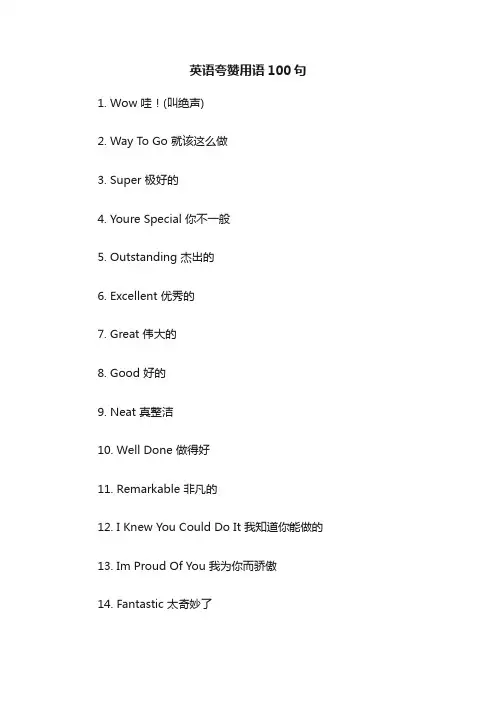
英语夸赞用语100句1. Wow 哇!(叫绝声)2. Way To Go 就该这么做3. Super 极好的4. Youre Special 你不一般5. Outstanding 杰出的6. Excellent 优秀的7. Great 伟大的8. Good 好的9. Neat 真整洁10. Well Done 做得好11. Remarkable 非凡的12. I Knew You Could Do It 我知道你能做的13. Im Proud Of You 我为你而骄傲14. Fantastic 太奇妙了15. Super Star 超级明星16. Nice Work 干得好17. Looking Good 看上去不错18. Youre On Top Of It 你是数一数二的19. Beautiful 美极了20. Now Youre Flying 现在你起飞了(进步了)21. Youre Catching On 你是有吸引力的22. Now Youve Got It 现在你做到了23. Youre Incredible 你简直难以置信24. You Can Do It 你能做到25. How Did You Do That? 你怎样完成的?26. Bravo 好啊!妙!27. Youre Fantastic 你真太妙了28. Youre Improving 你在进步29. Hurray For You 为你喊万岁30. Youre On Target 你达到目标了31. Youre On Your Way 你在前进中32. How Nice 多好啊33. Good Job 干的出色34. Thats Incredible 简直难以置信35. Hot Dog 热狗36. Lets Try Again 再试试37. Dynamite 非同凡响38. Youre Beautiful 你太美了39. Youre Unique 你太不寻常了40. Nothing Can Stop You Now 现在你已所向无敌了41. Good For You 为你好42. I Like You 我喜欢你43. Youre A Winner 你是赢家44. I Respect You 我尊敬你45. Youll Make It 你一定会成功的46. Remarkable Job 出色的工作47. Beautiful Work 完美的工作48. Spectacular 壮观的,引人入胜的49. I Like The Way You Handled That 我欣赏你的做法50. Youre Precious 你是宝贵的51. Great Discovery 伟大的发现52. Youve Discovered The Secret 你已经发现了秘密53. Youre Making Progress 你正在进步54. You Figured It Out 你搞懂了55. Fantastic Job 干的太好了56. Hip, Hip Hurray 万岁!(喝彩声)57. Bingo 你成功了58. I Believe Youll Handle It 我确信你能行59. Magnificent 杰出的60. Marvelous 非凡的61. Terrific 太妙了62. You Really Tried 你确实尽力了63. Thanks For Helping 感谢你的帮助64. Super Job 出色完成任务65. Creative Job 创造性的完成任务66. Super Work 超级完成任务67. Youre Sensational 你真令人感动68. I Like Your Work 我欣赏你的工作69. I Can See Progress 我已经看到了进步70. Exceptional Performance 非同一般的表现71. Youre A Real Trooper 你真实一个好骑手72. You Are Responsible 你是负责任的73. You Are Exciting 你真令人激动74. You Learned It Right 你做对了75. Look How Far Youve Come 瞧,你已经有多领先了76. What An Imagination 多么丰富的想象力!77. What A Good Listener 多么专注的听众啊!78. You Are Fun 你真有趣79. Youre Growing Up 你长大了80. You Tried Hard 你尽力了81. You Care 你很认真82. Outstanding Performance 出色的表现83. Youre A Good Friend 你是一个好朋友84. I Have Confidence In Your Judgment 我坚信你的判断85. I Trust You 我相信你86. Youre Important 你非常重要87. You Belong 你属于我们88. Youve Got A Friend 你已经得到了一个朋友89. You Make Me Laugh 你让我开怀大笑90. You Brighten My Day 你让我今天增辉不少91. I Respect You 我崇敬你92. Thats Correct 正确93. Youre A Joy 你真让人高兴94. Youre A Treasure 你是个宝95. Youre Wonderful 你真妙极了96. Awesome 真了不起97. You Made My Day 你今天真让我高兴98. Thats The Best 真出色99. A Big Hug 热情拥抱你100. A Big Kiss 亲吻你101. Say I Love You! 我要说,我爱你!P.S. Remember, A Smile Is Worth 1000 Words! 附:请记住,一个微笑胜过1000句话语。
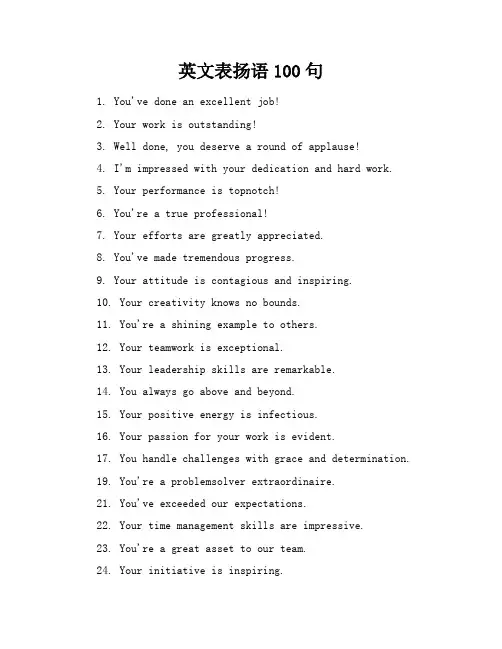
英文表扬语100句1. You've done an excellent job!2. Your work is outstanding!3. Well done, you deserve a round of applause!4. I'm impressed with your dedication and hard work.5. Your performance is topnotch!6. You're a true professional!7. Your efforts are greatly appreciated.8. You've made tremendous progress.9. Your attitude is contagious and inspiring.10. Your creativity knows no bounds.11. You're a shining example to others.12. Your teamwork is exceptional.13. Your leadership skills are remarkable.14. You always go above and beyond.15. Your positive energy is infectious.16. Your passion for your work is evident.17. You handle challenges with grace and determination.19. You're a problemsolver extraordinaire.21. You've exceeded our expectations.22. Your time management skills are impressive.23. You're a great asset to our team.24. Your initiative is inspiring.25. Your ability to adapt is remarkable.27. You're a true gem in our organization.28. Your customer service is outstanding.29. Your dedication to your craft is inspiring.30. You always put your best foot forward.31. Your work ethic is unparalleled.32. Your enthusiasm is contagious.33. Your knowledge and expertise are impressive.34. You're a pleasure to work with.35. Your resilience in the face of adversity is inspiring.37. You're a fantastic role model.38. Your innovative ideas are groundbreaking.39. Your punctuality is appreciated.40. Your organization skills are topnotch.41. You're a ray of sunshine in our workplace.42. Your empathy and understanding are valued.44. You're a great motivator.45. Your sense of humor brightens our day.46. Your reliability is unwavering.47. Your artistic talent is amazing.48. Your writing skills are exceptional.49. Your public speaking abilities are impressive.50. Your ability to stay focused is remarkable.51. You're a great mentor.52. Your ability to inspire others is truly special.53. Your punctuality sets a great example.54. Your dedication to learning is inspiring.55. Your ability to handle multiple tasks is impressive.56. Your positive outlook is refreshing.57. Your enthusiasm for life is contagious.58. Your confidence is inspiring.59. Your problemsolving skills are topnotch.61. Your leadership example is appreciated.62. Your creativity is unmatched.63. Your analytical skills are impressive.64. Your attention to detail is exceptional.65. Your ability to work well with others is valued.66. Your adaptability is remarkable.68. Your passion for your work shines through.70. Your time management skills are outstanding.71. Your customer service skills are excellent.72. Your technical expertise is impressive.73. Your teaching methods are effective and engaging.74. Your ability to stay calm in stressful situations is appreciated.75. Your genuine care for others is inspiring.77. Your vision and strategic thinking are valuable.78. Your dedication to personal growth is inspiring.79. Your ability to take feedback constructively is appreciated.80. Your loyalty and dedication are unwavering.81. Your professionalism is exemplary.82. Your ability to lead example is remarkable.83. Your resourcefulness is impressive.84. Your adaptability in a changing environment is valued.. Your ability to inspire trust is exceptional.88. Your dependability is reassuring.89. Your consistency in delivering highquality work is appreciated.90. Your ability to stay motivated is inspiring.92. Your ability to multitask is impressive.93. Your positive influence on others is evident.95. Your ability to connect with people is remarkable.97. Your honesty and integrity are invaluable.99. Your unwavering determination is inspiring.100. Your presence and contributions are truly missed when you're not around.当然,让我们继续丰富这份文档,提供更多温馨且真诚的表扬语句:英文表扬语100句(续)101. Your infectious smile brightens up any room.103. Your ability to see potential in others is a gift.104. Your dedication to making a difference is inspiring.106. Your artistic vision is a true testament to your creativity.107. Your diplomatic approach to conflicts is highly respected.108. Your consistent efforts to improve are a great example for others.109. Your genuine interest in others' wellbeing is appreciated.110. Your unwavering patience is something we all aspire to have.111. Your ability to remain optimistic in tough times is remarkable.112. Your strategic thinking is a valuable asset to any team.114. Your gentle nature is a calming influence in our busy world.115. Your capacity for forgiveness is a sign of true strength.116. Your ability to stay focused on your goals is inspiring.118. Your openmindedness is a breath of fresh air.119. Your passion for education is contagious and inspiring.120. Your resourcefulness in the face of limitations is impressive.122. Your ability to find joy in the little things is inspiring.124. Your sense of responsibility is a trait we all could learn from.125. Your ability to listen without judgment is a rare and valuable skill.126. Your enthusiasm for helping others is a beacon of hope.127. Your leadership style is inclusive and empowering.128. Your capacity for empathy is a beautiful quality.130. Your ability to inspire trust and confidence is a true talent.131. Your diplomatic skills are essential in our diverse workplace.133. Your nurturing nature makes you a wonderful mentor.134. Your attention to the needs of others is a sign of your kindness.135. Your talent for bringing out the best in people is remarkable.136. Your unwavering loyalty is a cornerstone of our team.137. Your creative problemsolving is invaluable to our success.138. Your ability to remain cool under pressure is truly impressive.139. Your vision for the future is both exciting and inspiring.141. Your ability to inspire others to reach their potential is a gift.142. Your keen eye for detail ensures that nothing is overlooked.143. Your positive attitude is a driving force in our team's success.144. Your strategic planning has been instrumental in our growth.145. Your ability to connect with people from all walks of life is remarkable.146. Your passion for justice is a powerful force for change.147. Your dedication to excellence is evident in everything you do.148. Your intuitive understanding of people is a valuable asset.149. Your patience and perseverance are a testament to your character.150. Your willingness to share your knowledge is greatly appreciated.151. Your ability to maintain a healthy worklife balance is inspiring.152. Your sense of humor lightens the mood and brings joy to others.153. Your capacity for selfreflection is a sign of your maturity.155. Your ability to inspire hope in others is a rare and precious gift.159. Your genuine concern for the wellbeing of others is heartwarming.160. Your talent for creating a harmonious work environment is invaluable.162. Your energy and enthusiasm are infectious and uplifting.163. Your thoughtful approach to decisionmaking is appreciated.165. Your strong moral character sets a high standard for us all.166. Your dedication to your craft is evident in the quality of your work.168. Your ability to adapt to new situations with ease is impressive.169. Your positive influence on your peers is a testament to your character.171. Your ability to bring people together is a true strength.172. Your genuine smile can brighten even the darkest days.173. Your creative spirit is a source of inspiration for us all.174. Your willingness to go the extra mile is noticed and appreciated.175. Your ability to see the potential in every challenge is当然,让我们继续丰富这份表扬语列表,保持语言的温暖和个性化:英文表扬语100句(续二)176. Your infectious enthusiasm for life is a constant reminder to chase our dreams.177. Your capacity for forgiveness shows a depth of character that is truly admirable.179. Your quiet confidence is a silent force that motivates those around you.180. Your ability to inspire loyalty and dedication is a mark of a true leader.182. Your dedication to personal growth is a shining example for others to follow.184. Your artistic flair brings beauty and creativity to everything you touch.185. Your strong sense of justice is a guiding light in your actions and decisions.1. Your emotional intelligence helps foster a supportive and understanding environment.189. Your positive outlook on life is a reminder that every challenge is an opportunity.190. Your willingness to listen and learn from others is a sign of true wisdom.193. Your genuine interest in the success of others makes you an invaluable team member.194. Your creative problemsolving skills are the cornerstone of our innovative projects.195. Your adaptability in the face of change is a quality that will serve you well in any situation.196. Your calm and measured approach to challenges is a lesson in grace under pressure.197. Your ability to connect with people on a deeperlevel is a rare and valuable trait.198. Your contributions to our team are consistently outstanding and essential to our success.199. Your humility, even in the face of great success, is a true measure of your character.200. Your unwavering belief in the potential of others is a gift that keeps on giving.These expressions of praise are not just words; they are powerful tools that can uplift, motivate, and validate the efforts of those around us. Use them thoughtfully and watch them create a positive ripple effect in your personal and professional relationships.。
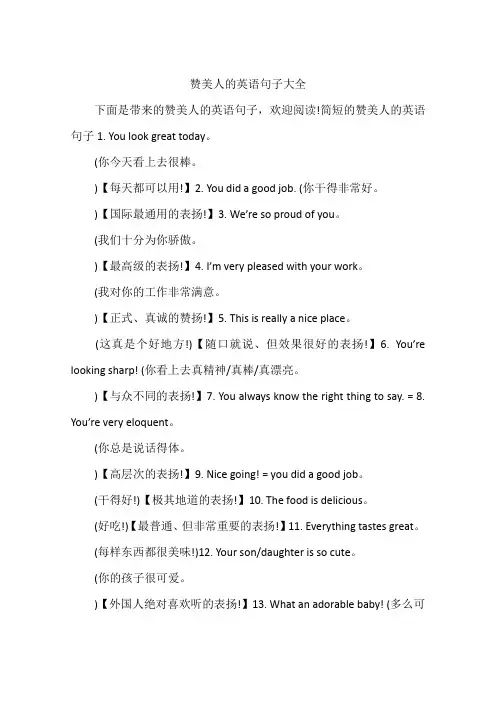
赞美人的英语句子大全下面是带来的赞美人的英语句子,欢迎阅读!简短的赞美人的英语句子1. You look great today。
(你今天看上去很棒。
)【每天都可以用!】2. You did a good job. (你干得非常好。
)【国际最通用的表扬!】3. We’re so proud of you。
(我们十分为你骄傲。
)【最高级的表扬!】4. I’m very pleased with your work。
(我对你的工作非常满意。
)【正式、真诚的赞扬!】5. This is really a nice place。
(这真是个好地方!)【随口就说、但效果很好的表扬!】6. You’re looking sharp! (你看上去真精神/真棒/真漂亮。
)【与众不同的表扬!】7. You always know the right thing to say. = 8. You’re very eloquent。
(你总是说话得体。
)【高层次的表扬!】9. Nice going! = you did a good job。
(干得好!)【极其地道的表扬!】10. The food is delicious。
(好吃!)【最普通、但非常重要的表扬!】11. Everything tastes great。
(每样东西都很美味!)12. Your son/daughter is so cute。
(你的孩子很可爱。
)【外国人绝对喜欢听的表扬!】13. What an adorable baby! (多么可爱的孩子。
)【只管大胆用!】14. I admire your work.15. I respect your work。
(我对你的工作表示敬意。
)【世界通用!】16. You’ve got a great personality。
(你的个性很好。
)【一个非常安全的表扬!】17. You have a good sense of humor。
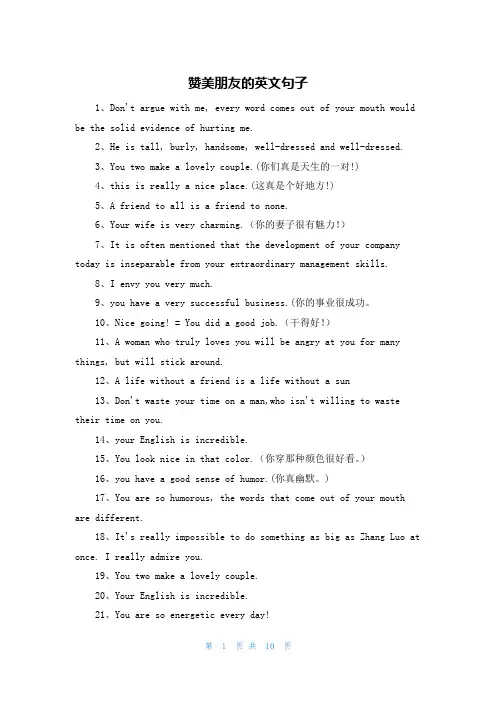
赞美朋友的英文句子1、Don't argue with me, every word comes out of your mouth would be the solid evidence of hurting me.2、He is tall, burly, handsome, well-dressed and well-dressed.3、You two make a lovely couple.(你们真是天生的一对!)4、this is really a nice place.(这真是个好地方!)5、A friend to all is a friend to none.6、Your wife is very charming.(你的妻子很有魅力!)7、It is often mentioned that the development of your company today is inseparable from your extraordinary management skills.8、I envy you very much.9、you have a very successful business.(你的事业很成功。
10、Nice going! = You did a good job.(干得好!)11、A woman who truly loves you will be angry at you for many things, but will stick around.12、A life without a friend is a life without a sun13、Don't waste your time on a man,who isn't willing to waste their time on you.14、your English is incredible.15、You look nice in that color.(你穿那种颜色很好看。
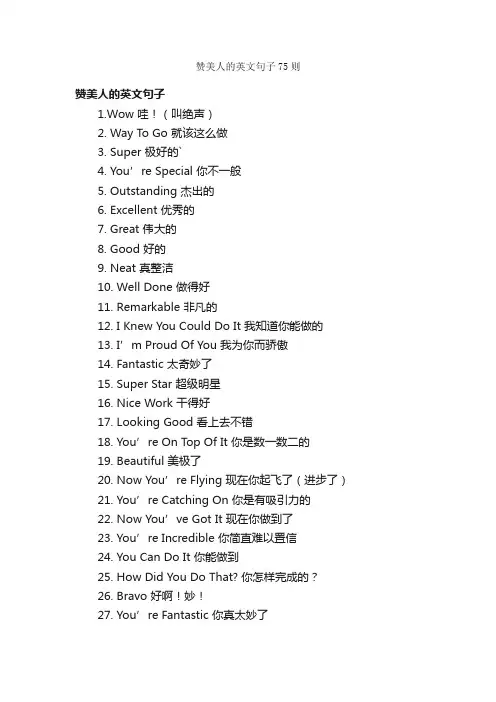
赞美人的英文句子75则赞美人的英文句子1.Wow 哇!(叫绝声)2. Way To Go 就该这么做3. Super 极好的`4. You’re Special 你不一般5. Outstanding 杰出的6. Excellent 优秀的7. Great 伟大的8. Good 好的9. Neat 真整洁10. Well Done 做得好11. Remarkable 非凡的12. I Knew You Could Do It 我知道你能做的13. I’m Proud Of You 我为你而骄傲14. Fantastic 太奇妙了15. Super Star 超级明星16. Nice Work 干得好17. Looking Good 看上去不错18. You’re On Top Of It 你是数一数二的19. Beautiful 美极了20. Now You’re Flying 现在你起飞了(进步了)21. You’re Catching On 你是有吸引力的22. Now You’ve Got It 现在你做到了23. You’re Incredible 你简直难以置信24. You Can Do It 你能做到25. How Did You Do That? 你怎样完成的?26. Bravo 好啊!妙!27. You’re Fantastic 你真太妙了28. You’re Improving 你在进步29. Hurray For You 为你喊万岁30. You’re On Ta rget 你达到目标了31. You’re On Your Way 你在前进中32. How Nice 多好啊33. Good Job 干的出色34. That’s Incredible 简直难以置信35. Hot Dog 热狗36. Let’s Try Again 再试试37. Dynamite 非同凡响38. You’re Beautiful 你太美了39. You’re Unique 你太不寻常了40. Nothing Can Stop You Now 现在你已所向无敌了41. Good For You 为你好42. I Like You 我喜欢你43. You’re A Winner 你是赢家44. I Respect You 我尊敬你45. You’ll Make It 你一定会成功的46. Remarkable Job 出色的工作47. Beautiful Work 完美的工作48. Spectacular 壮观的,引人入胜的49. I Like The Way You Handled That 我欣赏你的做法50. You’re Precious 你是宝贵的51. Great Discovery 伟大的发现52. You’ve Discovered The Secret 你已经发现了秘密53. You’re Making Progress 你正在进步54. You Figured It Out 你搞懂了55. Fantastic Job 干的太好了56. Hip, Hip Hurray 万岁!(喝彩声)57. Bingo 你成功了58. I Believe You’ll Handle It 我确信你能行59. Magnificent 杰出的60. Marvelous 非凡的61. Terrific 太妙了62. You Really Tried 你确实尽力了63. Thanks For Helping 感谢你的帮助64. Super Job 出色完成任务65. Creative Job 创造性的完成任务66. Super Work 超级完成任务67. You’re Sensational 你真令人感动68. I Like Your Work 我欣赏你的工作69. I Can See Progress 我已经看到了进步70. Exceptional Performance 非同一般的表现71. You’re A Real Trooper 你真实一个好骑手72. You Are Responsible 你是负责任的73. You Are Exciting 你真令人激动74. You Learned It Right 你做对了75. Look How Far You’ve Come 瞧,你已经有多领先了。
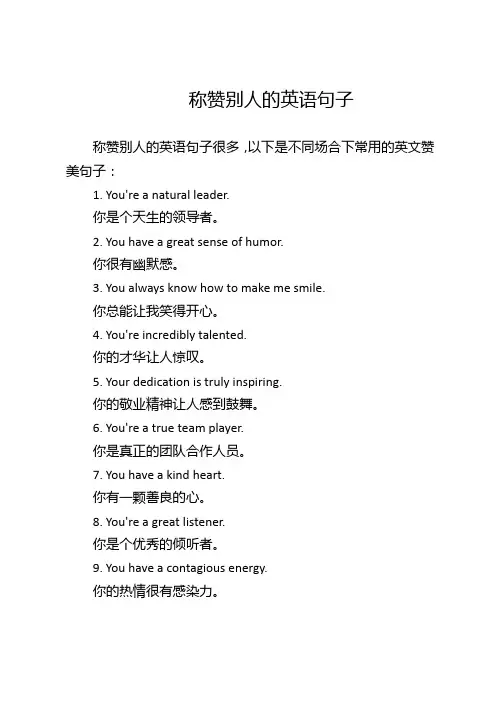
称赞别人的英语句子称赞别人的英语句子很多,以下是不同场合下常用的英文赞美句子:1. You're a natural leader.你是个天生的领导者。
2. You have a great sense of humor.你很有幽默感。
3. You always know how to make me smile.你总能让我笑得开心。
4. You're incredibly talented.你的才华让人惊叹。
5. Your dedication is truly inspiring.你的敬业精神让人感到鼓舞。
6. You're a true team player.你是真正的团队合作人员。
7. You have a kind heart.你有一颗善良的心。
8. You're a great listener.你是个优秀的倾听者。
9. You have a contagious energy.你的热情很有感染力。
10. You're always willing to help.你总是乐于助人。
11. You're a great problem solver.你是一个出色的问题解决者。
12. You have excellent communication skills.你的沟通技巧很棒。
13. You have a sharp and analytical mind.你头脑敏锐、分析力强。
14. You're a quick learner.你学习能力很强。
15. You have a remarkable attention to detail.你注重细节,让人钦佩。
16. You're a master at your trade.你在行业内是行家里手。
17. You're a great motivator.你是个很好的人员激励者。
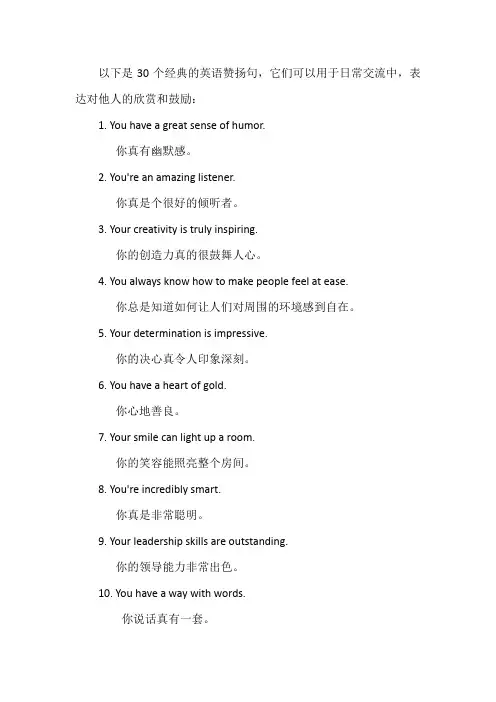
以下是30个经典的英语赞扬句,它们可以用于日常交流中,表达对他人的欣赏和鼓励:1. You have a great sense of humor.你真有幽默感。
2. You're an amazing listener.你真是个很好的倾听者。
3. Your creativity is truly inspiring.你的创造力真的很鼓舞人心。
4. You always know how to make people feel at ease.你总是知道如何让人们对周围的环境感到自在。
5. Your determination is impressive.你的决心真令人印象深刻。
6. You have a heart of gold.你心地善良。
7. Your smile can light up a room.你的笑容能照亮整个房间。
8. You're incredibly smart.你真是非常聪明。
9. Your leadership skills are outstanding.你的领导能力非常出色。
10. You have a way with words.你说话真有一套。
11. Your work is exceptional.你的工作非常出色。
12. You're incredibly talented.你真是非常有才华。
13. Your ideas are innovative and fresh.你的点子新颖又充满活力。
14. You're a natural leader.你天生就是个领导者。
15. Your kindness is contagious.你的善良感染力很强。
16. You have a way of making people feel special.你有一种让人们对自身感到特别的方法。
17. Your enthusiasm is contagious.你的热情感染力很强。
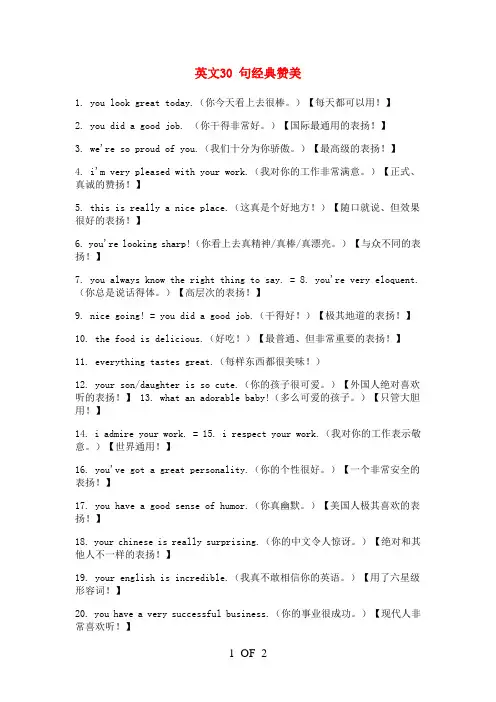
英文30 句经典赞美1. you look great today.(你今天看上去很棒。
)【每天都可以用!】2. you did a good job. (你干得非常好。
)【国际最通用的表扬!】3. we're so proud of you.(我们十分为你骄傲。
)【最高级的表扬!】4. i'm very pleased with your work.(我对你的工作非常满意。
)【正式、真诚的赞扬!】5. this is really a nice place.(这真是个好地方!)【随口就说、但效果很好的表扬!】6. you're looking sharp!(你看上去真精神/真棒/真漂亮。
)【与众不同的表扬!】7. you always know the right thing to say. = 8. you're very eloquent.(你总是说话得体。
)【高层次的表扬!】9. nice going! = you did a good job.(干得好!)【极其地道的表扬!】10. the food is delicious.(好吃!)【最普通、但非常重要的表扬!】11. everything tastes great.(每样东西都很美味!)12. your son/daughter is so cute.(你的孩子很可爱。
)【外国人绝对喜欢听的表扬!】 13. what an adorable baby!(多么可爱的孩子。
)【只管大胆用!】14. i admire your work. = 15. i respect your work.(我对你的工作表示敬意。
)【世界通用!】16. you've got a great personality.(你的个性很好。
)【一个非常安全的表扬!】17. you have a good sense of humor.(你真幽默。
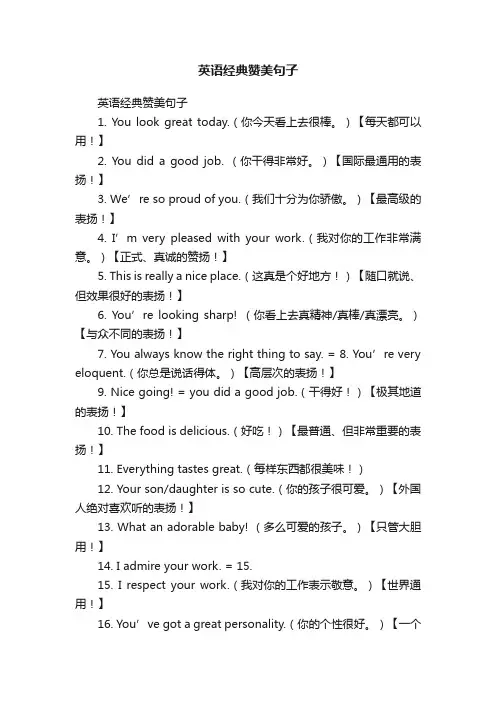
英语经典赞美句子英语经典赞美句子1. You look great today.(你今天看上去很棒。
)【每天都可以用!】2. You did a good job. (你干得非常好。
)【国际最通用的表扬!】3. We’re so proud of you.(我们十分为你骄傲。
)【最高级的表扬!】4. I’m very pleased with your work.(我对你的工作非常满意。
)【正式、真诚的赞扬!】5. This is really a nice place.(这真是个好地方!)【随口就说、但效果很好的表扬!】6. You’re looking sharp! (你看上去真精神/真棒/真漂亮。
)【与众不同的表扬!】7. You always know the right thing to say. = 8. You’re very eloquent.(你总是说话得体。
)【高层次的表扬!】9. Nice going! = you did a good job.(干得好!)【极其地道的表扬!】10. The food is delicious.(好吃!)【最普通、但非常重要的表扬!】11. Everything tastes great.(每样东西都很美味!)12. Your son/daughter is so cute.(你的孩子很可爱。
)【外国人绝对喜欢听的表扬!】13. What an adorable baby! (多么可爱的孩子。
)【只管大胆用!】14. I admire your work. = 15.15. I respect your work.(我对你的工作表示敬意。
)【世界通用!】16. You’ve got a great personality.(你的个性很好。
)【一个非常安全的表扬!】17. You have a good sense of humor.(你真幽默。
1.You are coming alone well.你做得挺顺利。
2.She is well-build.她的身材真棒。
3.You look neat and fresh.你看起来很清纯。
4.You have a beautiful personality.你的气质很好。
5.what a man多勇敢的人啊6.You are going to make it. 你准行!7.You are going to win. 你会赢的!8.You are my only hope. 你是我的希望。
9.You are almost there. Keep trying. Stick to it. 你马上就要成功了,坚持,坚持下去!10.You are the best. 你真是顶呱呱![这是母亲对儿子、女孩对男友常说的话。
]11.You are fantastic. 你太棒了!12.You are special. 你真特别![其实,一个SPECIAL就是最高的赞赏。
]13.You are amazing. 你真了不起!14.You are incredible. =You are so great. 你真难以置信。
15.You are one in a million. 你是万中挑一。
16.You are so clever. 你真聪明!17.You are perfect! 你太好了!18.You are a genius. 你真是个天才!19.You are a nice guy. 你是个不错的小伙子。
20.You are really something. 你真了不起!21.You are a lucky dog! 你真幸运!22.You are everything to me. 你是我的一切。
23.You are so sweet. 你可爱!24.You are my angel. 你是我的小天使!25.You are so kind. 你真好!26.You are so considerate! 你真体贴!27.You are the one for me. 你是我的梦中情人。
赞美人的英语句子1. You're amazing! Just like a bright star shining in the night sky. Example: "Look at her, she's so talented. You're amazing like her!"2. You're a rock star! You can handle anything thates your way. Example: "He solved that difficult problem so easily. You're a rock star!"3. You have such a kind heart. It's like a warm embrace. Example: "She always helps others. You have such a kind heart like her!"4. You're so smart. It's as if your brain is a supeputer. Example: "He understood that concept quickly. You're so smart just like him!"5. You're incredibly talented. Just like a master artist. Example: "Look at his paintings. You're incredibly talented like him!"6. You're a wonderful person. It's like a beautiful flower blooming. Example: "She has such a great personality. You're a wonderful person just like her!"7. You're so funny. It's as if you're a professionaledian. Example: "He always makes us laugh. You're so funny like him!"8. You're so brave. Just like a fearless warrior. Example: "She faced that challenge head-on. You're so brave like her!"9. You're extremely charming. It's like a magnet attracting everyone. Example: "He has such charisma. You're extremely charming like him!"10. You're a true gem. Just like a precious diamond. Example: "She's one in a million. You're a true gem like her!"My view is that everyone has their own unique qualities and闪光点, and we should always be ready to praise and appreciate those around us.。
中学英语积极词汇辨析小结151. look, see, watchlook看的动作,see看的结果,watch强调所看物体的变化、移动和发展watch TV152. lie, lay lie躺,位于(lay, lain),说谎(lied, lied),lay平放(laid, laid) lay the book153. work as, act aswork as工作是…,act as充当某种职务或身份,或扮演某种角色He works as a teacher. He acts as an interpreter.154. move, removemove动一动,但不一定移走,remove从一处移到另一处remove the table to the kitchen155. hurt, injure, woundhurt感情上受伤,injure事故中受伤,wound战争中受伤He was wounded in the war.156. turn, get, growturn表突变,后常接表颜色的词,get强调变的结果,grow强调过程,逐渐的变化. turn yellow, get tired, grow big157. close, shut, turn offclose和shut当关解时可以通用,用于可开合的物体,turn off用于指有开关的物体. Close/Shut the door. Turn off the TV.158. set out, set about, set off指出发,着手解时,set out 后接to do,set about 后接doing, set off 后接for sp.159. begin, startbegin侧重时间的开始,反义词为end,start侧重由静到动的转折,反义词为stop. Class begins at 7:30a.m.160. happen, take placehappen偶然性的没有预料到的事情的发生,take place必然性的发生. Great changes have taken place in my hometown.161. at, in (表地点)at小地点,in大地点arrive at a small village, arrive in Shanghai162. at work, in work at work在工作,在上班,in work 有职业,有工作. Both my parents are at work. They are not at home.163. increase to, increase byincrease to增长到…,increase by增长了… The number increased by 2,000 to 5,000.164. at ease, with ease at ease舒适地,安逸地;with ease容易地,无困难地do it with ease165. day after day, day by dayday after day日复一日(无变化);day by day一天天地(有变化)Trees grow taller day by day.166. like, as like相似关系,但并不等同,as同一关系,两者实为一体. Don't treat me as a child. (In fact, I'm a child.)167. after, in (表时间) after接时间点,in接时间段after 7:00, in five minutes168. between, amongbetween两者之间,三者或三者以上两两之间, among三者或三者以上之间. Switzerland lies between France, Germany, Australia and Italy.169. after, behind (表位置)after强调次序的先后,behind强调物体静态位置的前后There are many trees behind the house.170. since, for (完成时间状语)since接点时间或一句话,for接一段时间for three years, since 3:00171. on the corner, in the corner, at the corneron the corner物体表面的角上,in the corner物体内部的角落里,at the corner物体外部的角落上(拐角处)on the corner of the table172. warn sb. of, warn sb. againstwarn sb. of提醒某人注意某事,warn sb. against提醒某人不要做某事, warn him against swimming in that part of the river173. at peace, in peace at peace平静地,in peace和平地live in peace with one's neighbors174. on earth, on the earth, in the earthon earth在世上,在人间,到底,究竟,一点也不,on the earth在地上,在地球上,in the earth在地下,在泥土里no use on earth175. in surprise, to one's surprise, by surprisein surprise惊奇地,to one's surprise使某人吃惊的是,by surprise使…惊慌. The question took the professor by surprise.176. in the air, on the air, in the skyin the air正在酝酿中,on the air播送,广播,in the sky在天空中. His show is on the air at 6:00 tonight.177. in the field, on the fieldin the field在野外,on the field在战场上He lost his life on the field.178. in the market, on the marketin the market表示场所或地点,在市场上,on the market出售. He sells fish in the market. Fresh vegetables are on the market now.179. in the sun, under the sunin the sun在阳光下,under the sun地球上,全世界people under the sun180. in a voice, with one voicein a voice出声地,with one voice异口同声地They refused with one voice.181. through, across through穿越空间,across在…上穿过through the forest, across the desert182. on the way, in the wayon the way在前往…的路上,in the way挡路The chair is in the way.183. above, on, over above在上面,不接触,on在上面,接触,over在正上方fly over the hill184. until, not…untiluntil到…为止,not…until直到…才(常跟点动词连用)I waited until 3:00. He didn't come until 3:00.185. besides, except, except forbesides除了…还(包括在内)except除了(不包括在内),except for整体…除了某一点以外The composition is good except for a few spelling mistakes.186. whether, if当是否解时,只有在宾语从句中二者可以互换,其余都用whether,当如果解时用if I don't know if/whether he will come. If he comes, I'll let you know.187. and, orand并且,or或者,否则,常用于否定句中I don't like apples or bananas. Hurry up and you'll catch the bus. Hurry up or you'll miss the bus.188. because, since, as, for原因由强到弱为:because, since/as, for. 在句中的位置如下:1)…because… 2) Since/as…, … 3) …, for… Since I was ill, I didn't go.189. when, as, while (表时间)when从句动词点动词,持续性动词均可,as重在表示动作同时发生,伴随进行,while从句动词为持续性动词While I slept, a thief broke in.190. the same…as, the same…thatthe same…as和…一样的(相似但不同一),the same…that 同一物体, This is the same pen that I used yesterday. (同一支笔)191. as well, as well asas well也,常放于句末,和and连用表示既…又;as well as并列连词,不但…而且…; He is a professor, and a writer as well.192. such…as, such…thatsuch…as像…样的,s uch…that如此…以至于He is not such a fool as he looks like. He is such a good student that all the teachers like him.193. because, because ofbecause连词,连接两句话,because of介词短语,后接词或短语. He didn't go to school because of his illness.194. in order that, in order to表目的,in order that后接句子,in order to后接动词原形I got up early in order to catch the first bus. I got up early so that I could catch the first bus.195. for example, such asfor example一般只列举一个,such as列举多个例子I have been to a lot of American cities, such as New York, Atlanta and Chicago.196. used to, would表过去常常,和现在相对应用used to,不提现在用would. I used to get up early, but now I don't.197. All right. That's all right. That's right.All right. That's all right. 当好吧解时,可以替换;当不客气,没关系解时只能用That's all right. That's right. 那是对的---Sorry. --- That's all right.198. such…that, so…that当如此…以至于解时,such…that修饰名词,so…that修饰形容词或副词,但名词前面如果有many, much, little, few修饰用so…that,不用such that. so many people that… such a lovely boy=so lovely a boy199. so + be (have, can, do)+主语,neither(nor) + be (have, can, do)+ 主语也一样,肯定用so…否定用neither (nor) ---I can't play tennis. ---Nor can I.200. Shall I…? Will you…?Shall I…? 征求对方意见或向对方请示,意为我能…吗?Will you…?请求或建议对方做某事,意为你愿意…吗?Will you help me? Yes, I will.。